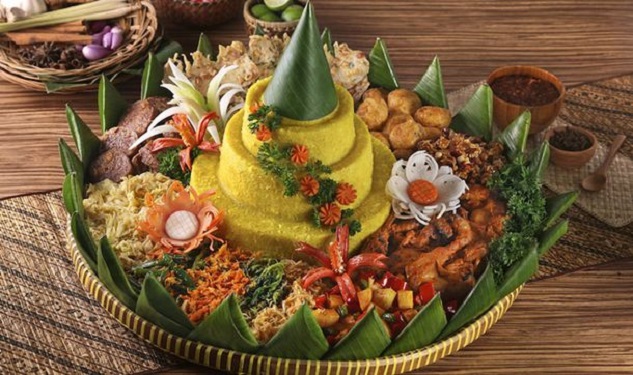Muslim population in Indonesia is up to 88% from its total 270 million people. So it’s not surprising that the majority of Indonesian cuisine is halal food.
Halal itself is a term used by Moslem around the world to indicate its conformity with the Islamic rules. The opposite of halal is called haram, which means forbidden or non-halal.
Basic non-halal food group are consisting of:
– Pork – both farm raised pork, and wild ones or hogs
– Blood – running blood, while traces on meat are acceptable
– Carrion – including carcass of animal dead not by proper butchering
– Sacrificial animals – animals used for ritual killings, or slaughtered not in the name of God
– Top land predators – animals which hunts by its claws, fangs, or combination of both
– Alcoholic beverages, either fermented or distilled drinks which causes drunk.
Included on the list are also food products that mimic, or originated from those forbidden eats. Excluded from the list is carcass from dead sea animals, i.e. fishes, whales, which is allowed to be consumed — given that its condition is still good for consumption.
Halal Certification from MUI (Majelis Ulama Indonesia): Majority of the ready to consume in Indonesia is proclaimed as Halal foods by LPPOM-MUI (The Assessment Institute for Foods, Drugs And Cosmetics, the Indonesian Council of Ulama) in cooperation with the Ministry of Health Republic of Indonesia for meticulous food inspection and standardization of the foods. Most halal food products sold for mass consumption in Indonesia is already successfully passed through this stage.
“If you taste Indonesian cuisine, at the same time you’ll consume our Muslim’s halal food,” said DR. Husnan Bey Fananie, Ambassador of the Republic of Indonesia to the Republic of Azerbaijan.
Indonesian Embassy in Baku are about to join the 22nd Azerbaijan İnternational Food Industry Exhibition 2016, from 19 – 21 May 2016 at Baku Expo Central. Indonesian Embassy are ready to introduce Indonesian halal food to the people of Azerbaijan. It’s one of the efforts to let Azerbaijan people connecting better with Indonesia’s culture through culinary.
“Different cuisines are connected to different cultures. Let’s get to know each other cultures better, starts from now on, so we can embrace unity with one another.”


